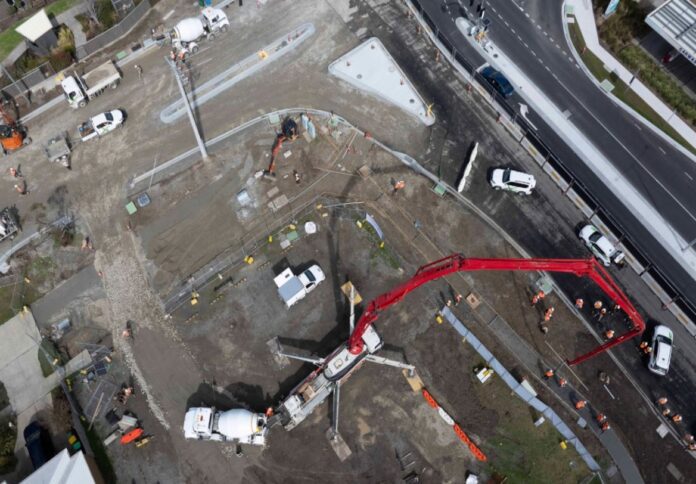
An innovative development from RMIT University has been successfully utilised in a major infrastructure project, marking an advancement in sustainable construction practices.
Coffee concrete, a new material mixed with biochar derived from spent coffee grounds, has been laid into a footpath along McGregor Road in Pakenham, as part of Victoria’s Big Build initiative, RMIT said in a news release.
The project, executed by Major Road Projects Victoria (MRPV) in collaboration with contractor BildGroup, integrates this eco-friendly concrete mix as a partial substitute for river sand, traditionally used in concrete production.
According to researchers, this shift not only aims to enhance the sustainability of construction but also addresses a pressing environmental issue: organic waste, including spent coffee grounds, is responsible for approximately 3 per cent of greenhouse gas emissions in Australia.
Data reported stated that each year, Australia generates about 75 million kilograms of ground coffee waste, much of which ends up in landfills.
The innovative use of coffee grounds as biochar in concrete has the potential to replace up to 655 million kilograms of sand, as the denser material offers substantial benefits.
Globally, around 10 billion kilograms of spent coffee is produced annually, which could replace up to 90 billion kilograms of sand in concrete applications.
For the Pakenham project, Earth Systems converted 5 tonnes of spent coffee grounds—equivalent to around 140,000 cups—into 2 tonnes of usable biochar, which was incorporated into the 30 cubic meters of concrete for the footpath.
This initiative is part of broader circular economy efforts for the Pakenham Roads Upgrade, which also includes the reuse of infill soil for the Princes Freeway embankments and the implementation of foam bitumen and rubber tire road barriers.
Brendan Pauwels, MRPV Program director, emphasised the ecological benefits of coffee concrete.
“These numbers are remarkable in terms of ecological benefit, and we’re excited to see the Pakenham Roads Upgrade be the first Victorian Big Build project to use the coffee concrete,” he stated.
Dr Rajeev Roychand, the lead inventor of the coffee concrete and a postdoctoral research fellow at RMIT, expressed enthusiasm about the partnership with BildGroup and MRPV.
“This proactive support plays a significant role in creating a potential for diverting all forms of biodegradable organic waste, which is currently ending up in landfills and contributing to 3% of Australia’s greenhouse gas emissions,” Roychand said.
BildGroup CEO Stephen Hill, an RMIT alumnus, expressed his pride in the company’s role in pioneering this initiative within the Australian construction industry.
“With the coffee concrete we’ve poured, we’re diverting an estimated 140,000 coffees from landfill and saving over 3 tonnes of sand, which have enormous environmental benefits,” Hill noted.
“From a triple bottom line perspective, this just makes good business sense.”
Earlier this year, RMIT partnered with Macedon Ranges Shire Council to conduct a successful trial of coffee concrete on a footpath in Gisborne, Victoria.
The RMIT team has developed a method to enhance concrete strength by 30 per cent using a low-energy process to convert coffee grounds into biochar.
However, due to current supply chain limitations, the coffee concrete used in the Gisborne trial had similar strength to standard concrete.
To further develop this innovation, RMIT is engaging with commercial partners and exploring opportunities in the construction and agriculture sectors that could benefit from biochar products.
The researchers acknowledge the support of ARUP Australia Pty Ltd, Earth Systems Pty Ltd, and RMIT University for their contributions to this groundbreaking project, as well as Indigenous-owned Talwali Coffee Roasters for supplying the used coffee grounds.
The research titled “Transforming spent coffee grounds into a valuable resource for the enhancement of concrete strength” was published in the Journal of Cleaner Production (DOI: 10.1016/j.jclepro.2023.138205).
Co-authors from RMIT include Dr Shannon Kilmartin-Lynch, Dr Mohammad Saberian, Professor Jie Li, Professor Guomin (Kevin) Zhang, and Professor Chun-Qing Li.




















